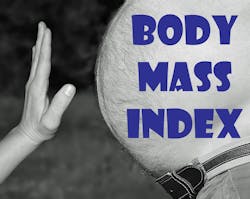There are many things we can’t control in police work, but health is something that, in large measure, we can control. Being healthy and fit allows us to not only live longer, but perform our job easier and more efficiently. Most people know how much they weigh, but that number alone doesn’t tell the whole story. Your health is predicated on a number of factors, height being one of them.
Body mass index, or BMI, is an indicator of whether or not you are healthy at your weight and height. BMI is calculated by taking a person’s weight in kilograms and dividing it by the square of height in meters. Sound complicated? Not to worry. Simply use the adult BMI calculator provided by the Centers for Disease Control and Prevention. Just plug in you height in feet and inches, along with your weight in pounds, and the BMI is automatically calculated for you.
Healthy BMIs
BMI helps to broadly define different weight groups in men and women 20 years old and older. The same numbers apply to both genders.
- Underweight: BMI less than 18.5
- Normal weight: BMI is 18.5 to 24.9
- Overweight: BMI is 25 to 29.9
- Obese: BMI is 30 or more
Healthcare professionals are inclined to use BMI to help determine if a patient has a weight problem. Using the index provides an estimate of total body fat for most people, but not all. Muscle weighs more than fat, therefore muscular people like bodybuilders may have a high BMI, but that doesn’t necessarily mean they are overweight. In the case of older patients who may have lost muscle mass due to aging, their BMI may appear normal when they could actually benefit from gaining some weight.
Research has consistently shown that people with a high BMI have a greater risk of serious health problems—heart disease, diabetes, and certain cancers. Logically, most people whose BMIs are high are, in fact, overweight or obese. Thus the diseases are a product of too much weight. However, when we use the word “most,” things become more complicated. Body mass index doesn’t factor in things such as bone structure, gender, genetics, or conditions such as osteoporosis. And it’s not an accurate indicator of how much fat one is carrying around. As we said, some athletes and bodybuilders will have a high BMI without being overweight or obese.
The American Cancer Society says that BMI, while giving a good estimate of total body fat for most people, doesn’t work well for all. However, it is a good way for many adults to get an idea of healthy weight ranges. The ACS advises there are other things to consider when judging how much someone should weigh. A health care provider might use other factors such as skin fold thickness, waist size, nutrition, family health history, and other factors when assessing risk based on a person’s weight.
While being overweight is certainly a concern, much more serious is being obese. Obesity is a complex disorder because it’s more than a cosmetic concern. Obesity leads to serious health problems such as heart disease, diabetes, and high blood pressure. BMI readings of 30 or higher indicate obesity. Simply stated, obesity occurs when someone eats more calories than they can burn through exercise and daily activities. The unburned calories are stored in the body as fat. While inactivity and a sedentary lifestyle can lead to obesity, most law enforcement folks will gain weight through an unhealthy diet and poor eating habits. The main offenders are fast food, high-calorie beverages, and excessive alcohol consumption. Add oversized portions and a diet lacking in fruits and vegetables to the mix and obesity becomes a reality.
Risk factors
There are other risk factors such as genetics. Genes may play a role in how efficiently your body converts food into energy and how it burns calories during exercise. Medical problems may also play a role. Some medications, including antidepressants, anti-seizure, diabetes, antipsychotics, steroids, and beta blockers may also cause weight gain. Quitting smoking often leads to weight gain, but the long term benefits of being a non-smoker are a greater benefit to one’s health. Lack of sleep or too much sleep may also contribute to weight gain because it can cause changes in hormones that increase your appetite. Having one or more of the above risk factors doesn’t mean you will become obese. Watching your diet, increasing physical activity, and changing behavior can help you avoid becoming obese.
While obesity can occur at any age, older folks are easily susceptible to weight gain. A less active lifestyle, coupled with hormonal changes and a decrease in muscle mass, leads to a decrease in metabolism. These changes also reduce calorie needs, making it more difficult to keep off excess weight. It’s imperative to consciously control what one eats and remain physically active to avoid weight gain.
Quality of life
Being overweight, particularly if you’re obese, negatively affects one’s quality of life. You may not be able to do things you used to enjoy, and you may avoid some public places such as swimming pools and beaches. Other quality of life issues may include: depression, disability, sexual problems, shame and guilt, social isolation, and lower work achievement.
How do you prevent becoming obese: Regular exercise as simple as walking and swimming. Following a healthy eating plan focusing on low-calorie, nutrient dense foods like fruits, veggies, and whole grains. Avoiding saturated fat and limiting sweets and alcohol. Monitoring weight regularly by weighing yourself once a week. Being consistent—sticking to your plan not only during the week, but also on weekends, vacations, and holidays.
Even a small weight loss may help lower the risk of possible disease. Talk with your healthcare provider to determine appropriate ways to lose weight. Strive to be the healthiest you can be and live longer while enjoying your best life.
Stay Safe, Brothers and Sisters!
About the Author
John Wills
John M. Wills is a former Chicago police officer and retired FBI agent. He is a freelance writer and award-winning author in a variety of genres, including novels, short stories and poetry. John also writes book reviews for the New York Journal of Books, and is a member of the National Book Critics Circle. His new book, The Year Without Christmas, is available now. Visit John at: www.johnmwills.com.

